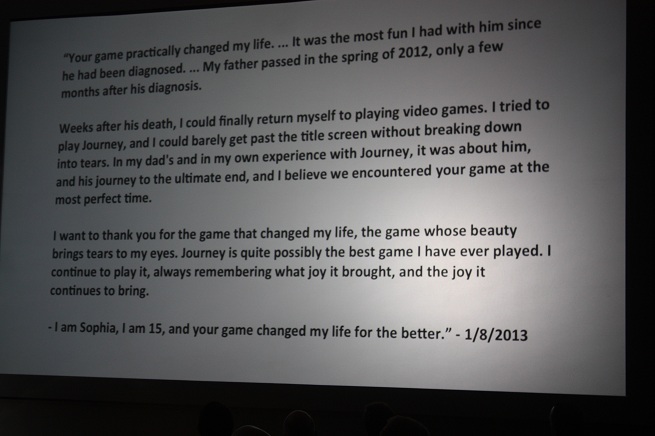 GamesBeat: How did you come up with the idea of a journey up a mountain?
GamesBeat: How did you come up with the idea of a journey up a mountain?
Chen: Do you remember some of the early concept art I showed? The massively multiplayer online concept? I forgot to mention that the goal of all those people in this world is that they’re lost. They’re trapped in the middle of the mountain. There’s this old saying in China. “You don’t see the forest because you’re in the forest.” You have to get out to realize you’re in the mountain.
The idea is that all these people are seeking enlightenment. They want to find the ultimate truth. But it’s vague. It’s a myth. No one knows what that ultimate truth is. Here, it happens to be on the top of the mountain. Everyone’s trying to get there. This concept of getting to a summit was always there, but I wonder why I came up with that idea. I don’t know. It’s a very good giant weenie, to use the Disney term. You need some giant landmark that always guides you when you get lost.
GamesBeat: People interpret it in very different ways. Would you consider it a religious game?
Chen: There were people asking me that at the early E3s. My answer is that I’m a spiritual guy. I grew in an atheist environment in Communist China where I wasn’t exposed to any religion. I’m quite spiritually curious. After I came to the States, and particularly after I read Joseph Campbell’s work, I did a lot of research trying to learn about the nuances and the differences in religions. I could see the common elements.
After I read so much, it felt like it was impossible for me to say that I’m a Buddhist or I’m a Christian, because they’re all the same. I would say that I’m a spiritual person, but because of that, we didn’t want to make Journey particularly Christian or particularly Buddhist or of any particular religion. That’s the greatness of Joseph Campbell’s work. His book, The Power of Myth, shows all these fundamental things that are shared among all cultures. That, to me, is what the truth is. I wanted to make Journey about a truth, about the most fundamental things.
It’s funny. Chinese gamers would say that I’m totally Buddhist, that this is a Buddhist game. Western players think that it’s about Christianity. I think that’s a good thing. People get more out of it if they put themselves into the game.
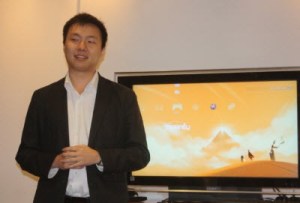 GamesBeat: It seems like if you cut off the ending; before you start again, it almost seems Western. If you start over and go through that reincarnation, it seems Eastern. [Laughs] It’s very open to interpretation.
GamesBeat: It seems like if you cut off the ending; before you start again, it almost seems Western. If you start over and go through that reincarnation, it seems Eastern. [Laughs] It’s very open to interpretation.
Chen: The heaven thing, we were debating. Maybe the heaven thing is too cheap? It’s like giving them a soft, candy-centered ending. The team debated it for quite a while. It was the playtest results that did it. We observed the players spending all this time going towards the end and expecting to see something there. If you just died there, that would definitely push you to think about what was going on. But eventually people would be angry at me. “This is what we paid all this money and spent all this time for? A gruesome death and that’s it?” I felt like I couldn’t face that accusation. I needed to satisfy them in terms of the visceral experience when they do die.
The final level is not in the world. If you look closely at it, it has all this water. It has a blue sky. Everything there indicates that it isn’t real. You’ve died. It’s a flash. According to some people who’ve seen the moment of death, they see white, and then they see the past flashing by. That’s why, in the summit level, you see all the things you’ve seen in the past — the strands of fish, the whale, all these wonderful things. You’re fooled by it for a moment. We wanted to simulate that feeling of death.
If Western players see that as heaven, fine. That’s what they want to see. But if you look into it at the end, there’s a tombstone. At the time I wanted to put a corpse right at the end, after you finish the heaven level. You’d see that it’s not real. Some of our developers — because this was a very multinational development team — said, “No, you can’t do that. You can’t just put a corpse there. It’s too morbid.” So we just put the tombstone there instead. You can see that the game isn’t just my point of view. It’s the entire team’s opinion and the entire team’s values.
 GamesBeat: You explained that in a lot of words, but it’s interesting that you have no words in the game.
GamesBeat: You explained that in a lot of words, but it’s interesting that you have no words in the game.
Chen: [Laughs] I think words complicate things. Our vocabulary is limited. There are words that exist in one language and not in another language. It creates barriers that keep us from understanding each other. I’m often frustrated using words to talk to people. I guess that’s why I have that craving for games like Journey, where it’s not about language. It’s also because I suck at writing English dialogue, though.
GamesBeat: Do you feel reasonably secure now, financially? You’ve got money to do what you need to do?
Chen: For now, yes. But can see a storm on the future horizon for me. [Laughs] With the money we have, our ambitions for our game and the scope of the team start to grow. It’s starting to get worrisome.
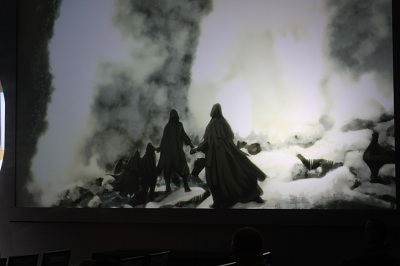 GamesBeat: I’m sure there are more people willing to make a bet on your team now.
GamesBeat: I’m sure there are more people willing to make a bet on your team now.
Chen: It’s a tremendous pressure. I didn’t expect Journey to see such an overwhelmingly positive reaction. I didn’t think I could make anything that could get 11 nominations here, for example. It’s been the turning point in my career. How am I supposed to make a game that’s even better? Journey is already about the ultimate life journey. That’s the pressure I’m under.
GamesBeat: Are you at the story-making stage, then? Are you working on a design?
Chen: We’re at that early phase where we try to figure out what kind of interactions can provide the feeling we want. Because of Flower and Journey, we have the arc. We know exactly how to go up and down through the moment. It’s more like, “What’s the core of it?” In Journey it’s the movement and the flying. We don’t have that quite yet. We’re still searching for it.
Sometimes it’s kind of scary. It’s already been eight months and we haven’t found it yet. That’s not a surprising thing if you look at Flower and Journey, but if you look at other companies, in eight months they’ve already finished a game. I’ve often felt guilty that I have all these things to play with, without making anything that’s profitable. Nothing’s easy. I almost don’t believe that anything easily made is any good.
GamesBeat: Are there other companies you’ve looked to for inspiration?
Chen: Right now I’m looking at Minecraft and Supercell. Everybody’s talking about those. I’ve become curious about how the hell they did this. I’ve been playing the Supercell games just to get an idea of what happened there. So far I don’t think have anything really positive to say. [Laughs]
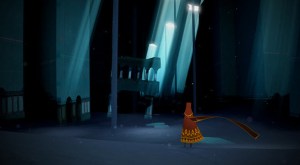 GamesBeat: It sounds like there is a winning formula in there that nobody else does. Uniqueness is what you guys have. Starting with the emotion seems to be a good way to figure things out.
GamesBeat: It sounds like there is a winning formula in there that nobody else does. Uniqueness is what you guys have. Starting with the emotion seems to be a good way to figure things out.
Chen: My New Year’s resolution is that I’ve been traveing since this last Christmas. I got to go to talks at various colleges and universities in China that have gaming programs. I did this in America and Europe before. What I see very consistently is that students come up after my talks asking if there’s any way they can work at our company. I say, “No, we’re very small.”
But the reason they ask is because, no matter what company they find, everybody’s focusing on how to get people more addicted to their games, how to keep them coming back, how to create monetization points. That’s not what they think games should be about. I think I’m somewhat responsible, because we’ve showed them that games can help people. There’s just no place for them to work.
The gamer knows that it’s possible to get these emotions from a game. Developers know that it’s possible to create games like this. What’s missing the guy with the money who wants to invest in them or publish them. They haven’t seen any major commercial success out of high-quality, emotional games, artistic games. Even though there’s all these passionate people who want to put their life into this, there’s no value in it.
So my resolution this year is: I’m not a money guy, but I want to make our next product a commercial success, so that people will say, “Hey, there’s a huge market out there. If you make a high-quality games that can touch people, it’s going to do great business.” Look at Pixar. Why doesn’t a company like that exist in the games industry? I want to make that commercial success. Even if it’s not me who ends up becoming that Pixar, someone will found it in the future.
GamesBeat: Mitch Lasky is very interesting in that respect. It seems like he might understand that more than most money people.
Chen: Yeah. It was Journey that brought Mitch into connection with me. He happened to play the game. If he hadn’t played it, I don’t think we would have ever found our way together. Journey, in a way, helped finance the company.
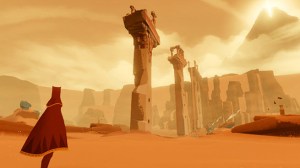 GamesBeat: You must have interesting conversations with him, about being practical or not. Monetization will matter at some point.
GamesBeat: You must have interesting conversations with him, about being practical or not. Monetization will matter at some point.
Chen: [Laughs] It’s interesting to juggle it. When I talk to the team, it has to be inspiring. If you just talk about money, they’re not excited. If I talk to investors or business guys, sometimes I have to switch to a different perspective. I think that in the last year, talking to various publishers and investors, I’ve finally gotten the idea of what they’re looking for. I can talk to them their way.
GamesBeat: There are some good things happening in the industry that should help you. The chance to go across platforms is there. If you don’t find a publisher, you can publish yourself.
Chen: Yeah. It was totally impossible in the past. The industry has changed so much. People are asking us about whether we think indie is mainstream now. We started this indie thing seven years ago. So much has changed.
GamesBeat: The multiplatform aspect has to make investors happier. That’s a good step to take. Reaching more people is probably a good thing.
Chen: One thing I believe as far as business is that a business’s true potential and value comes from how much service it can provide the world. If you look at Blizzard, they’ve always had the craft and the passion. Back in the day, they were making strategy games. They were for a hardcore market. All their games were genre leaders — Diablo, StarCraft — but they were never that financially successful. A friend of mine was there in the early days, and he was telling me that they didn’t even have air conditioning back when they were making StarCraft.
But when they started to make World of Warcraft, it was the same team, the same people, and the same process, except the game was serving more than just hardcore strategy players. There was role-playing. There was socializing. A lot of women started playing it. All of a sudden they became super-rich. It’s not as if they changed they way they did things. They just served a much bigger crowd.
For me, this is my business pitch. Our game is meant for average people to play, rather than just gamers. Our game doesn’t have language. It should reach a worldwide community. If our game can be delivered to that worldwide community, to everyone, why shouldn’t we make money? There has to be money there. When it comes to how we monetize it, there’s always a way.
VentureBeat's mission is to be a digital town square for technical decision-makers to gain knowledge about transformative enterprise technology and transact. Learn More
